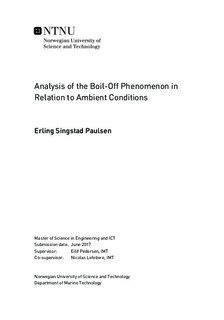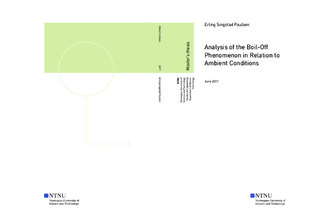| dc.description.abstract | The relationship between ambient conditions and the boil-off of liquefied natural gas during marine transportation has been investigated using a data-driven approach. The data consisted of sensory data collected from a vessel over a three year period coupled with global measurements of ambient conditions such as temperature and wave height. Statistical models were trained to predict the change in cargo level from ambient conditions, as the change in cargo level is a direct effect of boil-off. The models were then analyzed to assess the relative importance of the different ambient conditions.
The relevant data were extracted and put on a suitable format. The preprocessing consisted of outlier removal, noise reduction and synchronization of the data. Five datasets were constructed; one for each of the four cargo tanks and one for the cargo levels combined. Preprocessing of the cargo levels reduced the amount of data by about 95 %.
A crude polynomial model was used to simulate a virtual cargo level as a function of the real ambient conditions. The simulated data were inspected using statistical learning methods to verify that the employed methodology would uncover the relationships in the data. The models learned from the data showed strong similarities with the true model and improved the prediction error rate by 87.29 \%. Both linear and nonlinear models were trained.
The same methodology was employed on the real-world data. The best linear and nonlinear model reduced the prediction error rate by 45.20 % and 68.45 % respectively. The results verified that ambient conditions can be used to predict boil-off, although it is unlikely that true relationship is linear in nature. The parameter sensitivity of the best linear models was analyzed to assess the importance of the different ambient conditions. The results consistently ranked the ambient temperature and waves as most important, as expected due to heat leakage and sloshing in the tanks. From the best linear model, the change in cargo level was found to be varying linearly with ambient temperature, as shown in the literature, and nonlinearly with waves and wind. | |

